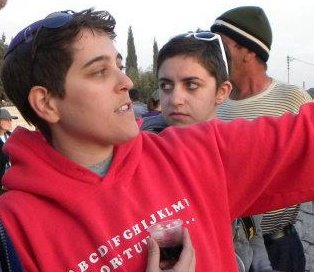Parshat Tetzaveh focuses on the priests’ vestments and ordination, building on last week’s plan and vision of the mishkan. The pivot point between these topics is a singular commandment about a particular activity within the daily service: “You (Moses) shall further instruct the Israelites to bring you clear oil of beaten olives for lighting, for kindling lamps regularly. Aaron and his sons shall set them up in the Tent of Meeting, outside the curtain which is over the Ark, to burn from evening to morning before Adonai. It shall be a due from the Israelites for all time, throughout the ages (Ex 27:20-21).”
What is this mitzvah doing here? Nehama Leibowitz points out that there must be a greater purpose for its placement here than housekeeping; particularly since the people aren’t given other mitzvot of this nature (like sweeping the floors). The Ner Tamid is akin to the light of Bereishit, which “constitutes the first of Divine creations to which all living creatures are drawn, the opposite of which serves as a symbol of doom and destruction (Nehama Leibowitz, Studies in Exodus, 520).” In the creation myth, the presence of light is the first step in Gd’s vision for a world inhabited by the rest of Gd’s creation. Establishing this light in the mishkan means instantiating this nourishing light of creation in the world.
We know light means hospitality and safety in our own lives when we flip the lightswitch before entering a dark room. Light is also communication. The mishkan itself—a tent—could have stood for hospitality and safety, but it is localized in one place. Light can be seen far away and can carry information. The light of the Ner Tamid is not just any light, it is the “clear oil of beaten olives.” Commenting on the crushed nature of the olives, Rashi, citing the Talmud (Menachot 86a), teaches that crushing olives in a mortar and pestle will allow one to extract oil without sediment, and that a second grinding happens that may be used for meal offerings. We are to use the purest oil for the lighting of the Ner Tamid; the purest oil will create the purest quality of light.
Activist movements have brought many new lights into our world. The passage of gay marriage laws across the country can be read as a sign of greater safety, as might the change in immigration laws announced by President Obama. But which lights have we lit? For the light to be the light of creation, to truly symbolize hospitable space, we must strive for the light of the clear oil of beaten olives. For our victories to really create an inclusive world, we must not only win initially, but communicate new rights and protections far and wide, defend them fiercely, and continue to push the boundaries. For LBGTQ equality, the first press oil is legislation that addresses misogyny and racism, that safeguards the rights of transwomen of color and makes sure that homeless youth have a place to go at night. The second press oil has its place in our world, as it did in the mishkan; marriage equality is an important cultural symbol of acceptance. Still, without the purest oil we are not bringing forward the light of creation.
Rabbi Becky Silverstein is currently serving as the Education Director at Pasadena Jewish Temple and Center. He also sits on the board of Keshet, a national organization working for LGBTQ inclusion in the Jewish world.


